


In 2020, in light of the crisis created by the COVID-19 pandemic, the risks of opaque and irrational management of budget resources increased significantly. The current situation significantly increased such risks due to public procurements conducted without tenders, increased foreign funding, and more. Considering these challenges, the effective exercise of parliamentary control over the activities of the government is of particular importance, one of the important mechanisms of which is the ability to send a written MP question to the accountable institution.
According to Article 148 of the Rules of Procedure of the Parliament of Georgia, a member of the Parliament is entitled to send a question to the Government of Georgia, other entities accountable to the Parliament, a member of the Government, a government body of a territorial unit of all levels, or a state institution. A timely and complete answer to the question is mandatory. The term is set at 15 days, although in the case of an agreement it is possible to extend the term by 10 days.
The public information published by the Parliament is made available on the Public Information Page of the Parliament of Georgia. One of the most important parts of this information is the MP Questions page, which allows one to get acquainted with the questions and answers received by the members of Parliament from government agencies.
According to the analysis of the documents posted on the page of MP Questions, in 2020, 34 MPs used this parliamentary control mechanism, sending a total of 843 letters to public institutions. In 2020, 179 of the questions were left unanswered, and 112 answers were given in excess of the 25-day deadline.
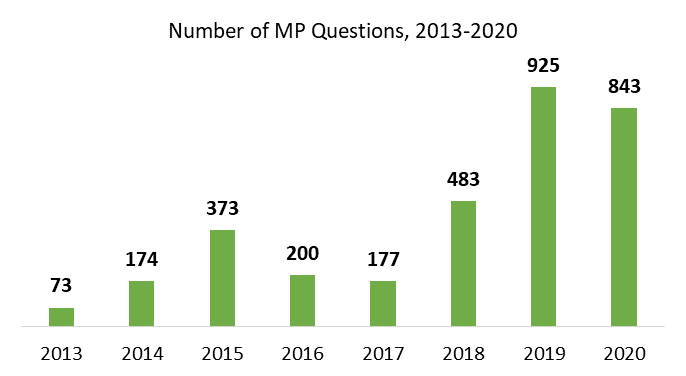
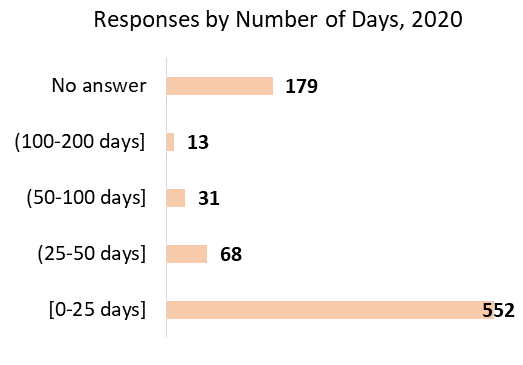
Source: info.parliament.ge
Most of the parliamentary questions sent in 2020 were sent by members of the parliamentary minority. Out of 843 parliamentary questions, 438 were sent from the representatives of the factions of "European Georgia", and 148 questions belonged to the deputies of the "National Movement". According to the analysis of the documentation posted on the MP Questions portal, the party affiliation of the author of the question does not have a significant impact on whether an answer is received. The percentage of unanswered requests varies between 12% and 21% by faction members. For example, 21% of the requests sent by the members of the faction "Georgian Dream" were left unanswered, the faction "European Georgia - Movement for Liberty" had 19% of questions unanswered, the factions "European Georgia - Regions" and "National Movement" had 26% and24% of unanswered questions, respectively.
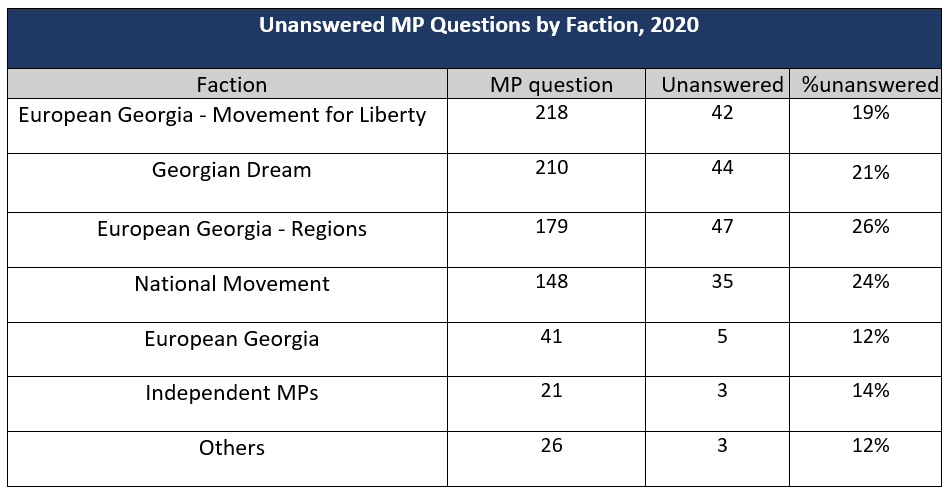
In 2020, most of the MP questions were related to various types of administrative expenses, management of state property, personnel policy, etc. Despite the urgency of the issue, only 3% of the questions (29 questions) were directlyrelatedto the Coronavirus pandemic. These questions were related to the costs of the pandemic, financial assistance provided by donor organizations to Georgia, statistics related to the virus, and more. The analysis of the answers received on each of them is presented below.
It is noteworthy that none of the questions regarding the Coronavirus pandemic were posed by a member of the parliamentary majority.
Table 2: MP Questions related to the COVID-19:
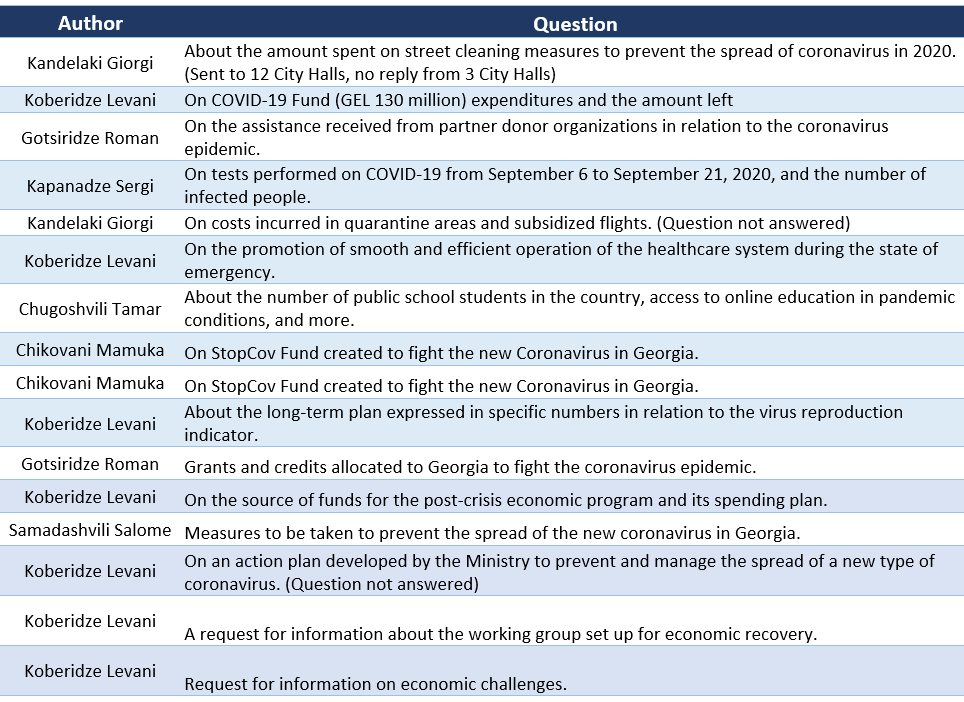
The information requested by MPs regarding the costs incurred during the pandemic relates to the disinfection costs of various municipalities, the costs of quarantine facilities, subsidized flights following the restriction of regular flights, and the spendings of the StopCov fund.
Based on the information posted on the MP Questions Portal, the questions sent to the Minister of Economy and Sustainable Development of Georgia regarding the expenses for quarantine areas and subsidized flights after the restriction of regular flights have been left unanswered.
A request for the amount spent on street disinfection solutions (procured to prevent the spread of the coronavirus) was sent to 12 city halls. 3 of them (Tbilisi, Batumi, and Poti mayors) have not responded. According to the information provided by the other 9 municipalities, a total of 76,378 GEL was spent on such measures, of which the largest amount, 27,035 GEL, was spent by the Zugdidi Municipality. According to the response of the Akhaltsikhe and Zestaponi City Halls, the disinfection events were carried out by private companies free of charge.
Table 3: Funds spent on street disinfection solutions to prevent the spread of coronavirus, 2020:
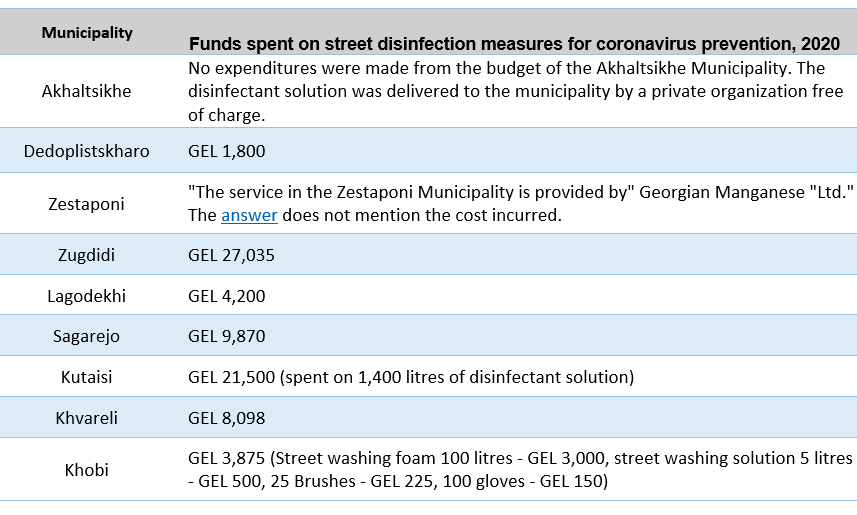
A letter requesting information regarding the funds received by the StopCov Fund, their donors, and the expenses incurred by the Fund was originally sent in May 2020. According to the response of the Ministry of Finance, by that time, GEL 133,583,704.9 had been transferred to the Fund, none of which had been spent. As for the identities of the donors, the author of the question explained that following Article 18,3 of the Constitution of Georgia, the information about the donors was not public information, except for those who publicly announced the transfer of funds to the StopCov Fund. Later, in response to a letter sent to the Minister of Health, the author of the question was informed that 123,692,000 GEL was allocated from the StopCov Fund (133,500,000 GEL) for the provision of one-time social assistance to children under 18 under as part of the anti-crisis plan, and the cost of the program is 122,759,200 GEL.
In 2020, an MP question was sent to the Minister of Economy and Sustainable Development of Georgia regarding the sources of 2 billion USD allocated for the post-crisis economic program and its expenditure plan. The sender also tried to get information about the short-term and long-term measures to support small and medium-sized businesses as part of this program. In response to these requests, the Minister of Economy and Sustainable Development sent a report on the measures taken by the government. Regarding the support of local production, it is clarified that the decision was made to promote sugar production in the country, with natural gas being supplied to the sugar factory at a reduced price. The reason for this support was the problem with sugar imports during the crisis and the expected rise in prices.
The response states that in order to restore local production, "Agara Sugar Factory has the opportunity to process and supply the market with 70 thousand tons of sugar by the end of the year, which is more than half of total consumption." ... "Currently, Agara Sugar Factory is the only sugar processing factory in Georgia. Consequently, any enterprise that decides to produce sugar will receive the same support."
The parliamentary question on the financial assistance provided to Georgia by donor organizations during the Coronavirus pandemic was initially sent to the Minister of Finance in April. According to the response received, Georgia expected about $1.5 billion from international donor organizations. Georgia received $200 million in an agreement with the International Monetary Fund (IMF) approved on May 1. Also on May 1, "an agreement was signed between Georgia and the International Bank for Reconstruction and Development (IBRD) for a €73.1 million rapid response project against COVID-19." The Asian Infrastructure Investment Bank (AIIB) has allocated $100 million for the same project. According to the letter, an agreement for 190 million euros was reached between Georgia and the French Development Agency (AFD). The government also intended to attract $1.5 billion in funding from partner donor organizations to support the private sector.
Later in September, the Minister of Finance received a requestregarding the current state of mobilization of $1.5 billion for the support of the private sector. According to the Ministry, they did not have information on private sector funding by donor organizations. The following funds were mobilized in the form of budget assistance:
- Approximately 517 million euros and 200 million US dollars are written off;
- Requests have been sent for the transfer of funds amounting to 360 million euros, which must be written off by the end of this year;
- Signing procedures are underway for $430 million.
Only 2 questions have been sent regarding the epidemiological situation in the country. The first question requested information about the tests performed for COVID-19 between September 6 and September 21, 2020, and the number of infected people. A complete answer was provided by the Centers for Disease Control.
In the second question, the member of the Parliament of Georgia requested a document kept in the Ministry of Health (if such a document existed) that would reflect a long-term plan expressed in specific numbers on the indicator of virus reproduction and forecasts of the epidemic situation under different scenarios. The MP was interested in knowing the threshold (rate/parameter) after which the Ministry of Health issued a recommendation to tighten the restrictions imposed in the state of emergency.
According to the answer of July 2 to the question "On the long-term plan expressed in concrete numbers concerning the virus reproduction indicator," we learn that the following methodologies are used to analyze the epidemiological situation in Georgia:
- Pennsylvania COVID-19 Hospital Impact Model for Epidemics;
- Mathematical modeling developed by the University of Basel (Switzerland);
- FluSurge 2.0 Method of US Centers for Disease Control and Prevention for Influenza Pandemic
The author of the letter also explained that decisions on restrictive measures are made by the Coordinating Council. Their severity "depends on many factors, including "the number and severity of Covid-19 cases, the geographical area of distribution, the number of clusters, on the other hand, the human and hospital capacity in the healthcare system, the epidemic situation in neighboring countries, etc."
In June 2020, the Prime Minister of Georgia announced that a working group had been established to restore the economy, with representatives from Cambridge and the University of London and the Deloitte office. A member of Parliament of Georgia, Levan Koberidze, addressed the Minister of Economy and Sustainable Development with a request for various information related to the activities and funding of the working group.
According to the answer of the Minister of Economy, Natela Turnava, the economic plan was created together with 2 different international consulting groups. The work carried out under the USAID Economic Governance Program was fully funded by the US Agency for Development and Cooperation and was scheduled to be completed in July 2020. The team of international experts involved in the project includes:
Luis Paniaga - Project Manager
Warren Coates - Monetary Economist
Stephen Simansky - Fiscal Economist
Jessica Maino - Economic Governance Advisor
Steve Levarn - Economic Governance Advisor
Ron McMoran - Fiscal Advisor
"The work to be carried out by UNDP-invited experts is fully funded by the United Nations Development Program and is scheduled to be completed by August 2020." The invited experts are:
- Ha Jun Chang: Leading Researcher. Professor at the University of Cambridge, Head of the Center for Development Policy (University of Cambridge).
- Christopher Kramer: Researcher in Agriculture, Tourism and Export Promotion
- Jonathan Di Johnny: Researcher in Tax, Finance, and Energy
- Kirill Zachi: Assistant Researcher
Analysis of the questions sent regarding the coronavirus pandemic shows that, despite the urgency of the issue, only a small part of the members of parliament of the previous convocation exercised the right to ask a parliamentary question. It must be mentioned that no pandemic-related questions were sent by the majority members.
The evidence published on the MP Questions Portal also shows that there is a significant number of cases when public institutions do not fulfill their legal obligations and do not provide information to the Member of Parliament upon request. This fact significantly damages the quality of parliamentary control, as well as reduces the degree of public trust in the management of the coronavirus pandemic.
IDFI hopes that the newly convened Members of Parliament will pay considerable attention to the effective exercise of parliamentary control and will actively use all the mechanisms at their disposal, including the opportunity to ask parliamentary questions.
____
The publication was prepared in frames of the project – Empowered Civil Society and Enhanced Beneficial Ownership Transparency Standards for Good Governance – funded by the Governments of Czechia, Hungary, Poland and Slovakia through Visegrad Grants from International Visegrad Fund. The mission of the fund is to advance ideas for sustainable regional cooperation in Central Europe.
The responsibility of the content of the article lies with the Institute for Development of Freedom of Information (IDFI). It does not necessarily reflect the opinions of International Visegrad Fund.